| Shepherds of Christ Daily Writing |
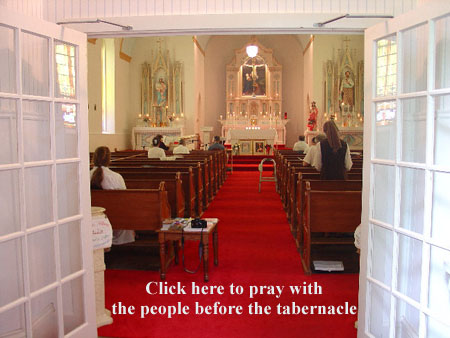 |
October 22,
2014|
October 23rd Holy Spirit Novena |
The Novena Rosary
Mysteries |
Pray for Dan, Jimmy, Blue Book 14,
Fr. Joe's homily book, &
for special intentions.
Please pray for funds & grace.
October 22, 2014
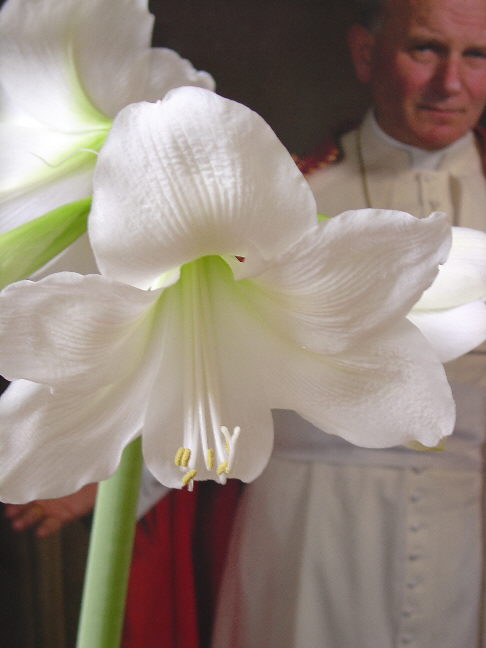
Excerpt from September 4, 2010
R. John Paul II called us to be witnesses of hope
preached the power of the Word
over the power of the sword —
Pope John Paul II described himself as a
witness to hope
Pope John Paul II was born in 1920
Poland suffered from World War I
Pope John Paul II was 9 years old when
his mother died
3 years later his brother a doctor died
Pope John Paul II said his father was so religious
and always praying
Mary is our Mother
We have been given a great gift in the
popes of the 20th century —
In the time when there was World War I
When Hitler rose to power
Where World War II devastated the world —
Fighting and wars
We had the wonderful Pope Pius XII
Pope John XXIII
Pope Paul VI
We had the Vatican II Council
And then Pope John Paul II — a witness of hope —
With the rise of secularism
The relative thinking
Pope John Paul II was so solid in the witness of truth
he gave to all of us —
In these last prayer services Our Lord has been
teaching us about Faith, Hope and Love
Mary appeared at Fatima May 13, 1917
World War I was then raging —
The angel of peace appeared three times in
1916 —
Excerpt from Rosary Meditations for Parents and Children
two
Fatima: The Message
(3)Before receiving the six apparitions of Our Lady, May through October of 1917, the three Fatima visionaries were visited by an angel on three different occasions during the preceding year. He appeared to them in the spring, summer, and fall. Lucia (now Sr. Lucia) describes the springtime apparition of the angel:
On reaching us, he said: "Do not be afraid! I am the Angel of Peace. Pray with me."
Kneeling on the ground, he bowed down until his forehead touched the ground and made us repeat these words three times:
"My God, I believe, I adore, I hope and I love You! I ask pardon of You for those who do not believe, do not adore, do not hope and do not love You."
Then, rising he said: "Pray thus. The Hearts of Jesus and Mary are attentive to the voice of your supplications."
His words engraved themselves so deeply on our minds that we could never forget them
During the summer of 1916, the angel again appeared to the three visionaries. He said to them:
(4)Pray! Pray a great deal. The Hearts of Jesus and Mary have merciful designs on you. Offer prayers and sacrifices continually to the Most High. Make everything you do a sacrifice, and offer it as an act of reparation for the sins by which God is offended, and as a petition for the conversion of sinners. Bring peace to our country in this way.... I am the Guardian Angel of Portugal Accept and bear with submission all the sufferings the Lord will send you.
In the fall of the same year, the angel visited the visionaries a final time:
(5)The angel came...bearing a golden chalice in one hand and a Host above it in the other. The amazed children noticed that drops of blood were falling from the Host into the chalice. Presently, the angel left both suspended in mid-air and prostrated himself on the ground, saying this beautiful prayer: "Most Holy Trinity, Father, Son and Holy Spirit, I adore You profoundly. I offer You the most precious Body, Blood, Soul and Divinity of Jesus Christ, present in all tabernacles of the world, in reparation for the outrages, sacrileges, and indifference by which He is offended. By the infinite merits of the Sacred Heart of Jesus and [the intercession of] the Immaculate Heart of Mary, I beg of Thee the conversion of poor sinners."
Sr. Lucia relates how the angel gave them Communion:
Then, rising, he took the chalice and the Host in his hand. He gave the Sacred Host to me and shared the Blood from the chalice between Jacinta and Francisco, saying as he did so:
(6)"Take and drink the Body and Blood of Jesus Christ, horribly outraged by ungrateful men! Make reparation for their crimes and console your God."
Reflecting upon these messages of the angel, we see how much they contain for our spiritual instruction.
First of all, we notice the distinctive Trinitarian nature of the messages. We are instructed that, in our Christian existence, we must express the greatest reverence for Father, Son, and Holy Spirit, as we serve them through the virtues of faith, hope, and love. These three virtues are at the heart of our life of grace.
We are reminded of the ugly reality of sin and of our duty to make reparation for it. We are reminded that reparation is due Christ in His Eucharistic presence. And, as we shall soon see, Our Lady calls for a specific act of reparation--the five first Saturdays. Reparation is a foundation of the Fatima messages.
The angel also tells us that we must not only love God; we must also love our neighbor. We are to pray and make sacrifices for others.
In telling us to "Pray a great deal," and "Make everything you do a sacrifice," the angel reminds us that we are to live a deep spirituality. We are to be united with God throughout the day in as conscious a manner as possible. Regarding the angel's call to prayer, we shall soon hear of Mary's special request concerning the daily Rosary. It is a request that reminds us that God has sent Our Blessed Mother to call us back to Jesus, and to a closer union with Him. The Fatima message indeed reminds us that Mary is our spiritual Mother, that she is our mediatrix with Christ.
The angel specified a need to help others by our sacrifices, and to accept the sufferings God sends.
NOTES:
3.
Louis Kondar, SVD, editor, Fatima in Lucia's
Own Words (Fatima: Postulation Center,
1976), p.62. Distributed in the U.S.A. by the
Ravengate Press, Cambridge, MA.
4. Our Lady's Peace Plan,
op cit.,
pp.1-2.
5. Ibid., p.2 (The words in brackets are
my own-added for clarification).
6. Fatima in Lucia's Own Words,
op
cit., pp.64-65.
The angel bowed down, he put his forehead
to the ground and made the
children repeat 3 times
"My God, I believe, I adore, I hope and
I love You! I ask pardon of you
for those who do not believe, do not adore,
do not hope and do not love you."
Faith, hope and love
The greatest commandment is:
Matthew 22: 36-40
'Master, which is the greatest commandment of the Law?' Jesus said to him, 'You must love the Lord your God with all your heart, with all your soul, and with all your mind. This is the greatest and the first commandment. The second resembles it: You must love your neighbour as yourself. On these two commandments hang the whole Law, and the Prophets too.'
The angel said to offer prayers and sacrifices
as an act of reparation
for the sins by which God is
offended and for the conversion
of poor sinners —
On the 3rd Visit - the angel said
"Most Holy Trinity, Father, Son and Holy Spirit, I adore You profoundly. I offer You the most precious Body, Blood, Soul and Divinity of Jesus Christ, present in all tabernacles of the world, in reparation for the outrages, sacrileges, and indifference by which He is offended. By the infinite merits of the Sacred Heart of Jesus and [the intercession of] the Immaculate Heart of Mary, I beg of Thee the conversion of poor sinners." (5)
Then, rising, he took the chalice and the Host in his hand. He gave the Sacred Host to me and shared the Blood from the chalice between Jacinta and Francisco, saying as he did so:
"Take and drink the Body and Blood of Jesus Christ, horribly outraged by ungrateful men! Make reparation for their crimes and console your God." (6)
5. Our Lady's Peace Plan, op cit., p.2. (The words in brackets are my own-added for clarification).
6. Fatima in Lucia's Own Words, op cit., pp.64-65.
The message of the Blue Books —
intimacy with God —
the Holy Eucharist
Adoration of the Blessed Sacrament
The message of the Shepherds of Christ —
consecration to the Sacred Heart and Immaculate Heart
Devotion of the Sacred Heart and Immaculate Heart
Displaying the images of the Sacred Heart and Immaculate Heart
Consecrating all places on the earth to the Sacred Heart and Immaculate
Heart
On May 13, 1981 Pope John Paul II was shot
The next year May 13, 1982 he made a pilgrimage to
Fatima
end of excerpt

Excerpts from the Priestly Newsletter 1998 - Issue 3
I am the good shepherd: the good shepherd is one who lays down his life for his sheep. The hired man, since he is not the shepherd and the sheep do not belong to him, abandons the sheep and runs away as soon as he sees a wolf coming, and then the wolf attacks and scatters the sheep; this is because he is only a hired man and has no concern for the sheep. I am the good shepherd; I know my own and my own know me, just as the Father knows me and I know the Father; and I lay down my life for my sheep. (Jn 10:11-151)
Yes, the Good Shepherd has laid down His life for us. Through His brutal death on the cross and His glorious resurrection, Jesus has given us a new life. Indeed, He has established a new world order. He has drawn all things to Himself. St. Paul speaks eloquently concerning this in his Letter to the Colossians:
He is the image of the unseen God
and the first-born of all creation,
for in him were created
all things in heaven and on earth:
everything visible and everything invisible,
Thrones, Dominations, Sovereignties, Powers—
all things were created through him and for him.
Before anything was created, he existed,
and he holds all things in unity.
Now the Church is his body,
he is its head.
As he is the Beginning,
he was first to be born from the dead,
so that he should be first in every way;
because God wanted all perfection
to be found in him,
and all things to be reconciled through him and for him,
everything in heaven and everything on earth,
when he made peace
by his death on the cross. (Col. 1:15-20).Pope John Paul II also reminds us of the cosmic dimension of Christ’s redemptive Incarnation: "The Incarnation of God the Son signifies the taking up into unity with God not only of human nature, but in this human nature, in a sense, of everything that is ‘flesh’: the whole of humanity, the entire visible and material world. The Incarnation, then, also has a cosmic significance, a cosmic dimension. The 'first born of all creation’ becoming incarnate in the individual humanity of Christ, unites himself in some way with the entire reality of man, which is also ‘flesh’—and in this reality with all ‘flesh’, with the whole of creation."2
Yes, through His enfleshment Christ has assumed, or united to Himself, not only the human family, but the entire world order. The Christian’s attitude toward authentic human values should therefore be obvious. He or she should love the world as redeemed by Jesus more than does the non-believer. The Christian should be the first to love all authentic human values. The Christian should be the first to promote these values. Obviously, the real progress of these values can only be according to their Christic design, however hidden this design may be at times.
Yes, the Christian should be the first to be willing to suffer for the authentic progress of the human race and the entire world order. And why? We reiterate—because it all belongs to Christ.
The Christian should grieve because all is not well with the temporal order. He or she should be duly disturbed that there is so much violence, murder, social injustice, lust for power, drug peddling, pursuit of hedonism, increased alienation from God. These and other evils sadly mar the name and image of Jesus which He imprinted upon the world through His life, death, and resurrection. The Christian should grieve because the cosmic face of Christ is thus so often covered by the sinful dust of the market place.
However, the market place, the temporal order, is not all evil. Far from it, it is basically good with the creative goodness of God. It’s basic goodness and beauty have been deepened by the grandeur of Jesus’ redemptive effort. There is so much good in so many human hearts, and this goodness manifests itself in so many ways.
Each Christian, grieving at the world’s evil, but rejoicing in its goodness and potential for greater good, must be inspired to action. He or she should deeply love the world because it belongs to Christ. He or she should deeply love the people who cover the face of this world, because they have been redeemed by the sacred Blood of Jesus, and are precious to our Savior to a degree we can never fully comprehend.
The love of the Christian for the human family and the world which encompasses this family must be an operative, an efficacious love. Permeated with this love, a person must be willing to do, to accomplish, and, in rare cases, to die for the cause of Christ. Whatever one’s state of life—whether one is a social activist or a cloistered contemplative—this is the privilege and the responsibility of the Christian. The Christian cannot be committed to Jesus in love without concomitantly being dedicated in love to one’s neighbors and the entire God-given world order.
If the Christian is to promote the good of the world order, one must be free regarding it. The more one possesses this freedom, the more one helps promote the Christic progress of the world. We must be free so that we use the things of this world, or not use them, depending upon what God’s will directs us to. Indeed, the one involved in the affairs of the world according to God’s will is the one who helps promote the world’s true progress.
There follow various thoughts concerning Christ, the Christian, and the world.
The face stares out at us from the magazine page. It is the face of a little child, a war orphan. Hunger, loneliness, fear, physical pain—all this is revealed in the tiny features.
The child has not placed these afflictions upon herself. No, forces over which she has no control have put these severe sufferings upon such little shoulders.
As we look at the picture, what is our reaction? Do we quickly turn to another page to find more pleasant material? Do we remain basically unmoved by what we see? Do we say others are to blame, and therefore, we have no responsibility toward such children? Or are we seriously moved? Do we tell ourselves we all have a responsibility to do something so that the number of these ravaged children will decrease rather than increase?
The picture of the child is there for all of us to see. What picture of ourselves emerges from our particular kind of reaction?
Pope John Paul II makes this observation concerning today’s world: "The development of technology and the development of contemporary civilization, which is marked by the ascendency of technology, demand a proportionate development of morals and ethics. For the present, this last development seems unfortunately to be always left behind. Accordingly, in spite of the marvel of this progress, in which it is difficult not to see also authentic signs of man’s greatness, signs that in their creative seeds are revealed to us in the pages of the book of Genesis, as early as where it describes man’s creation, this progress cannot fail to give rise to disquiet on many counts. The first reason for disquiet concerns the essential and fundamental question: Does this progress, which has man for its author and promoter, make human life on earth ‘more human’ in every aspect of that life? Does it make it more ‘worthy of man’? There can be no doubt that in various aspects it does. But the question keeps coming back with regard to what is more essential: whether in the context of this progress man, as man, is becoming truly better, that is to say more mature spiritually, more aware of the dignity of his humanity, more responsible, more open to others, especially the neediest and the weakest, and readier to give and to aid all."3
Here is another observation of Pope John Paul II concerning our present-day world: "A disconcerting conclusion about the most recent period should serve to enlighten us: side by side with the miseries of under development, themselves unacceptable, we find ourselves up against a form of superdevelopment, equally inadmissible, because like the former it is contrary to what is good and to true happiness. This superdevelopment, which consists in an excessive availability of every kind of material goods for the benefit of certain social groups, easily makes people slaves of ‘possession’ and of immediate gratification, with no other horizon than the multiplication or continual replacement of the things already owned with others still better. This is the so-called civilization of ‘consumption’ or ‘consumerism’, which involves so much ‘throwing-away’ and ‘waste’. An object already owned but now superseded by something better is discarded, with no thought of its possible lasting value in itself, nor of some other human being who is poorer.
"All of us experience firsthand the sad effects of this blind submission to pure consumerism: in the first place a crass materialism, and at the same time a radical dissatisfaction, because one quickly learns—unless one is shielded from the flood of publicity and the ceaseless and tempting offers of products—that the more one possesses the more one wants, while deeper aspirations remain unsatisfied and perhaps even stifled."4
Vatican II reminds us that Christ in His paschal mystery has entered into the world’s history, has taken this history to Himself, and has summarized it:
"For God’s Word, through whom all things were made, was Himself made flesh and dwelt on the earth of men. Thus He entered the world’s history as a perfect man, taking that history up into Himself and summarizing it. He Himself revealed to us that ‘God is love’ (l Jn 4:8). At the same time He taught us that the new command of love was the basic law of human perfection and hence of the world’s transformation.
"To those, therefore, who believe in divine love, He gives assurance that the way of divine love lies open to all men and that the effort to establish a universal brotherhood is not a hopeless one. He cautions them at the same time that this love is not something to be reserved for important matters, but must be pursued chiefly in the ordinary circumstances of life.
"Undergoing death itself for all of us sinners, He taught us by example that we too must shoulder that cross which the world and the flesh inflict upon those who search after peace and justice. Appointed Lord by His resurrection and given plenary power in heaven and on earth, Christ is now at work in the hearts of men through the energy of His Spirit. He arouses not only a desire for the age to come, but, by that very fact, He animates, purifies, and strengthens those noble longings too by which the human family strives to make its life more human and to render the whole earth submissive to this goal.
"Now, the gifts of the Spirit are diverse. He calls some to give clear witness to the desire for a heavenly home and to keep that desire green among the human family. He summons others to dedicate themselves to the earthly service of men and to make ready the material of the celestial realm by this ministry of theirs. Yet He frees all of them so that by putting aside love of self and bringing all earthly resources into the service of human life they can devote themselves to that future when humanity itself will become an offering accepted by God.
"The Lord left behind a pledge of this hope and strength for life’s journey in that sacrament of faith where natural elements refined by man are changed into His glorified Body and Blood, providing a meal of brotherly solidarity and a foretaste of the heavenly banquet."5
Pope Paul VI speaks to us about our life in Christ: "One could well meditate the ‘distinctive mark’ imprinted on the Christian; it is a seal superimposed on the divine image already naturally outlined in the soul of rational man, giving him with ever-increasing clearness the face of Christ, which the face of the Christian becomes when stamped with this mystic impression.
"This is a stupendous anthropology, often too little realized in the conception of man become Christian. Indeed, today the tendency to secularization, or to neglect of religious values and duties, leads to disregard of the Christian physiognomy molded by the sacramental character, so that it often becomes masked (for it cannot be erased) by a profane appearance.
This very nearly results in a return to a purely natural or even pagan aspect, the fact being forgotten that the term ‘Christian’ is not simply nominal, but real, involving entrance into the life of Christ, a decisive act for whoever follows Him, committing him utterly—if he does not want to betray the honour of his title—to fidelity, danger, and testimony (Acts 11,26; l Pet 4, 16).6
Here are certain stanzas from one of the poems of St. Therese of Lisieux, who has recently been declared to be a doctor of the Church by Pope John Paul II:
It’s to you alone Jesus, that I’m attached.
It’s into your arms that I run and hide.
I want to love you like a little child.
I want to fight like a brave warrior.
Like a child full of little attentions,
Lord, I want to overwhelm you with caresses,
And in the field of my apostolate,
Like a warrior I throw myself into the fight!…Your heart that preserves and restores innocence
Won’t betray my trust!
In you, Lord, rests my hope.
After this exile, I’ll go to see you in Heaven…
When in my heart the storm arises,
To you, Jesus, I lift up my head.
In your merciful look,
I read: "Child, for you I made the Heavens".I know well, my sighs and tears
are before you, all radiant with charms,
The seraphim in Heaven form your court,
And yet you beg for my love!…You want my heart, Jesus, I give it to you.
I surrender all my desires to you,
And those whom I love, O my Spouse, my King,
From now on I only want to love them for you.7Here is an excerpt from a spiritual journal (Rita Ring): "And I opened my heart, but I waited and felt suspended in mid-air for my whole desire was to embrace Him and it felt as if He did not come. I suffered and suffered and wanted only to experience Him with this outpouring of His grace. Then His grace overtook my weary soul and He dwelt in me in this heightened form. The Bridegroom made Himself known to me and then it felt as if this intensity had left, but the lingering memory of this moment when He intimately united Himself to me was implanted forever on my weary soul, as I sit and wait for that day when I will experience the fulfillment of myself existing only in Him. I long to have oneness in the Divine Master, the Bridegroom of my soul. I love you Jesus, come to me, that I may know you most intimately. Embrace my soul and fill me with your gifts. I desire to experience the deepest union with you, my Bridegroom, Jesus Christ, Savior of the world, Lamb of God. Through my union with you, My Jesus, I desire to experience the deepest union with the Father in the Holy Spirit."
And, "I rested my head on the pierced chest of my Savior. I felt His presence and put my head on His pierced wound. I see His side and I experience the wound within my own heart. His Heart was wounded by our sins, and I rest upon this wound.
"Open up the wound and go into His burning Heart. See the wound opening and enter into the great, red abyss of His fiery love. It is in the wound that I enter.
"His glorified body has this wound. It is from His pierced Heart that our life flows.
"The glorified wounds of Christ are my delight. He carried the cross. He bore the pain. He was pierced that we could live in Him!"
Fr. Edward Leen, C.S. Sp., reminds us: "It is only if we take up our crosses daily, that is, face each task that each day brings with courage, intent only on doing it rightly and well, striving to succeed, but not making success the condition of our efforts, doing it because it is God’s bidding, and not because it holds out a prospect of ministering to our egoism—it is only on this condition that our life will produce its transforming effect on us, and make us like to Jesus Christ…"8
St. Catherine of Siena, doctor of the Church, gives us these inspiring words on the human will:
I acknowledge, eternal God;
I acknowledge, eternal God, high eternal Trinity,
that you see me and know me.
I have seen this in your light…
I see too
that you saw that perverse law in us
that is always ready to rebel against your will,
and you saw
that we would often follow that law (cf. Rom 7:22-23).
Truly I see
that you saw the weakness of this human nature of ours,
how weak and frail and poor it is.
This is why,
supreme provider
who have provided for your creature in everything,
and best of helpers
who have given us help for every need—
this is why you gave us
the strong citadel of our will
as a partner for this weakness of our flesh.
For our will is so strong
that neither the devil nor any other creature
can conquer it
unless we so choose—
unless free choice,
in whose hand this strength has been put,
consents to it.
O infinite goodness!
Where is the source of such strength
in your creature’s will?
In you,
supreme and eternal strength!
So I see
that our will shares in the strength of yours,
for out of your will
you gave us ours.9
Archbishop Luis M. Martinez tells us: The true Director of souls, the intimate Master, the soul of the spiritual life, is the Holy Spirit. Without Him, as we have already said, there is no sanctity. The perfection of a soul is measured by its docility to the movement of the Spirit, by the promptitude and fidelity with which its strings produce the divine notes of the song of love. A soul is perfectly holy when the Spirit of love has taken full possession of it, when the divine Artist finds no resistance or dissonance in the strings of that living lyre, but only celestial strains coming forth from it, limpid, ardent, and delightfully harmonized."10
NOTES:
Scriptural quotations are taken from The Jerusalem Bible, Doubleday & Co.
Pope John Paul II, Encyclical Dominum et Vivificantem, as in The Encyclicals of John Paul II, edited with introductions by J. Michael Miller, C.S.B., Our Sunday Visitor Publishing Division, No. 50. 3.
Pope John Paul II, (Encyclical) Redemptor Hominis, as in The Encyclicals of John Paul II, (see above note), No. 15. 4.
Pope John Paul II, Encyclical Sollicitudo Rei Socialis, as in The Encyclicals of John Paul II, (see note 2 above), No. 28. 2&3.
The Documents of Vatican II, "Pastoral Constitution on the Church in the Modern World", America Press Edition, No. 38.
The Teachings of Pope Paul VI, Libreria Editrice Vaticana, p. 125.
St. Thèrèse of Lisieux, Poem 36, as in Spiritual Life, Spring 1998.
Edward Leen, C.S.Sp., In the Likeness of Christ, Sheed and Ward, p. 240.
From The Prayers of Catherine of Siena, Suzanne Noffke, translator, Paulist Press, as found in Catherine of Siena, Mary O’ Driscoll, O.P., editor, New City Press, Prayer 14, pp. 74-76.
Archbishop Lius M. Martinez, The Sanctifier, Pauline Books and media, p. 18.
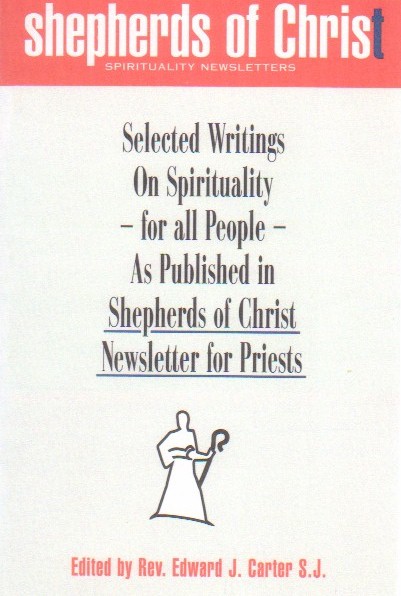
Excerpt from the Priestly Newsletter January/February 1995
The Holy Father offers us some very meaningful words on the subject of faithfulness. Faithfulness, of course, is one of the chief characteristics of love: “Virgo fidelis, the faithful Virgin. What does this faithfulness of Mary mean? What are the dimensions of this faithfulness? The first dimension is called search. Mary was faithful first of all when she began, lovingly, to seek the deep sense of God’s plan in her and for the world. ‘Quomodo fiet? How shall this be?’, she asked the Angel of the Annunciation.
“The second dimension of faithfulness is called reception, acceptance. The quomodo fiet is changed, on Mary’s lips, to a fiat, ‘Let it be done, I am ready, I accept.’ This is the moment in which man perceives that he will never completely understand the ‘how’; that there are in God’s plan more areas of mystery than of clarity; that, however he may try, he will never succeed in understanding it completely…
“The third dimension of faithfulness is consistency to live in accordance with what one believes; to adapt one’s life to the object of one’s adherence. To accept misunderstanding, persecutions, rather than a break between what one practices and what one believes; this is consistency…
“But all faithfulness must pass the most exacting test, that of duration. Therefore, the fourth dimension of faithfulness is constancy. It is easy to be consistent for a day or two. It is difficult and important to be consistent for one’s whole life. It is easy to be consistent in the hour of enthusiasm. It is difficult to be so in the hour of tribulation.”4
4. Pope John Paul II, Inside the Vatican, December, 1994, pp. 29-39.
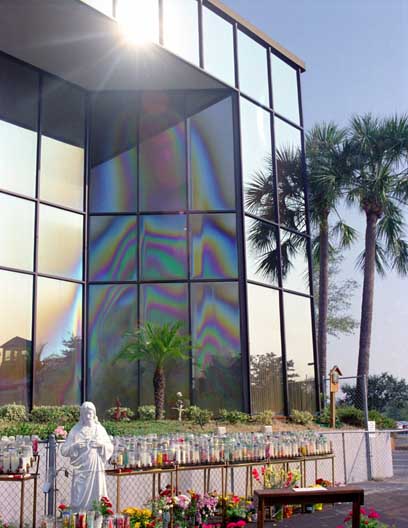
From Priestly Newsletter 2000 Issue 3
In speaking of Fatima, Pope John Paul II also speaks of the rosary.
On May 12, 1982, Pope John Paul II made a pilgrimage to Fatima. One of his motives for his visit was to offer thanks for Mary’s intercession in saving his life relative to the assassination attempt a year earlier.
Some fifteen years later in 1997, the Holy Father gave us the following words regarding Fatima. Lynne Weil, a newspaper reporter, gives this account: "Pope John Paul said the series of Marian apparitions at Fatima, Portugal, rank as one of the most significant events of this century.
"The string of apparitions that ended 80 years ago was ‘one of the greatest’ signs of the times, ‘also because it announces in its message many of the signs that followed and it invites (us) to follow their call’, the pope said in a letter to Bishop Serafim de Sousa Ferreire Silva of Leiria - Fatima, Portugal. The message, dated October 1, was released at the Vatican October 14 (1997).
"Pope John Paul said the event at Fatima ‘helps us to see the hand of God’ even in the 20th century, with its wars and other mass tragedies. And it showed that despite having ‘removed itself from God’, humanity was offered God’s protection, the pontiff said.
"Pope John Paul recalled that in Gospel accounts of Jesus’ death, he invoked clemency on his captors even as he was being crucified and entrusted humanity to the care of his mother, Mary.
"The pope repeated the exhortation stemming from the Marian apparitions at Fatima that the faithful recite the rosary every day. He asked pastors to recite the rosary, and to teach others to recite it, daily. —CNS"
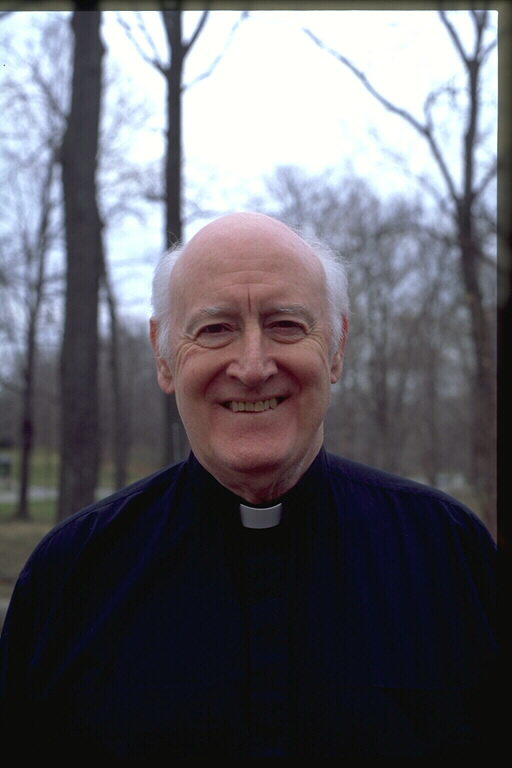
Excerpt from the Priestly Newsletter September/October 1997
Pope John Paul II, in his encyclical, On Human Work, observes: "The Christian finds in human work a small part of the cross of redemption in which Christ accepted his cross for us. In work, thanks to the light that penetrates us from the resurrection of Christ, we always find a glimmer of new life, of the new good, as if it were an announcement of 'the new heavens and the new earth' (cf 2 Pt 3:13; Rev 21:1) in which man and the world participate precisely through the toil that goes with work. Through toil-and never without it.
"On the one hand, this confirms the indispensability of the cross in the spirituality of human work; on the other hand, the cross which this toil constitutes reveals a new good springing from work itself, from work understood in depth and in all its aspects and never apart from work."5Again, Pope John Paul II speaks to us concerning our sharing the cross and resurrection of Jesus: "Those who share in Christ's sufferings have before their eyes the paschal mystery of the cross and resurrection in which Christ descends, in a first phase, to the ultimate limits of human weakness and impotence: Indeed, he dies nailed to the cross. But if at the same time in this weakness there is accomplished his lifting up, confirmed by the power of the resurrection, then this means that the weaknesses of all human sufferings are capable of being infused with the same power of God manifested in Christ's cross. In such a concept, to suffer means to become particularly susceptible, particularly open, to the working of the salvific powers of God offered to humanity in Christ. In him God has confirmed his desire to act especially through suffering, which is man's weakness and emptying of self, and he wishes to make his power known precisely in this weakness and emptying of self."6
5. Pope John-Paul II, On Human Work (Laborem Exercens), United States Catholic Conference, No. 27.
6. Pope John-Paul II, On the Christian Meaning of Suffering (Salvific Doloris), United States Conference, No. 23.

Excerpt from the Priestly Newsletter 1998 - Issue 2
Pope John Paul II reminds us that the Eucharist builds the Church: "It is an essential truth, not only of doctrine but also of life, that the Eucharist builds the Church, building it as the authentic community of the People of God, as the assembly of the faithful, bearing the same mark of unity that was shared by the Apostles and the first disciples of the Lord. The Eucharist builds ever anew this community and unity, ever building and regenerating it on the basis of the Sacrifice of Christ since it commemorates his death on the Cross, the price by which he redeemed us. Accordingly, in the Eucharist we touch in a way the very mystery of the Body and Blood of the Lord, as is attested by the very words used at its institution, the words with which those called to this ministry in the Church unceasingly celebrate the Eucharist." 11
11. Pope John Paul II, Daily Meditations, Editions Paulines, p. 198.
Excerpts from the Priestly Newsletter 1998 - Issue 3
Pope John Paul II also reminds us of the cosmic dimension of Christ’s redemptive Incarnation: "The Incarnation of God the Son signifies the taking up into unity with God not only of human nature, but in this human nature, in a sense, of everything that is ‘flesh’: the whole of humanity, the entire visible and material world. The Incarnation, then, also has a cosmic significance, a cosmic dimension. The 'first born of all creation’ becoming incarnate in the individual humanity of Christ, unites himself in some way with the entire reality of man, which is also ‘flesh’—and in this reality with all ‘flesh’, with the whole of creation."2
Yes, through His enfleshment Christ has assumed, or united to Himself, not only the human family, but the entire world order. The Christian’s attitude toward authentic human values should therefore be obvious. He or she should love the world as redeemed by Jesus more than does the non-believer. The Christian should be the first to love all authentic human values. The Christian should be the first to promote these values. Obviously, the real progress of these values can only be according to their Christic design, however hidden this design may be at times.
Yes, the Christian should be the first to be willing to suffer for the authentic progress of the human race and the entire world order. And why? We reiterate—because it all belongs to Christ.
The Christian should grieve because all is not well with the temporal order. He or she should be duly disturbed that there is so much violence, murder, social injustice, lust for power, drug peddling, pursuit of hedonism, increased alienation from God. These and other evils sadly mar the name and image of Jesus which He imprinted upon the world through His life, death, and resurrection. The Christian should grieve because the cosmic face of Christ is thus so often covered by the sinful dust of the market place.
However, the market place, the temporal order, is not all evil. Far from it, it is basically good with the creative goodness of God. It’s basic goodness and beauty have been deepened by the grandeur of Jesus’ redemptive effort. There is so much good in so many human hearts, and this goodness manifests itself in so many ways.
Each Christian, grieving at the world’s evil, but rejoicing in its goodness and potential for greater good, must be inspired to action. He or she should deeply love the world because it belongs to Christ. He or she should deeply love the people who cover the face of this world, because they have been redeemed by the sacred Blood of Jesus, and are precious to our Savior to a degree we can never fully comprehend.
The love of the Christian for the human family and the world which encompasses this family must be an operative, an efficacious love. Permeated with this love, a person must be willing to do, to accomplish, and, in rare cases, to die for the cause of Christ. Whatever one’s state of life—whether one is a social activist or a cloistered contemplative—this is the privilege and the responsibility of the Christian. The Christian cannot be committed to Jesus in love without concomitantly being dedicated in love to one’s neighbors and the entire God-given world order.
If the Christian is to promote the good of the world order, one must be free regarding it. The more one possesses this freedom, the more one helps promote the Christic progress of the world. We must be free so that we use the things of this world, or not use them, depending upon what God’s will directs us to. Indeed, the one involved in the affairs of the world according to God’s will is the one who helps promote the world’s true progress.
There follow various thoughts concerning Christ, the Christian, and the world.
The face stares out at us from the magazine page. It is the face of a little child, a war orphan. Hunger, loneliness, fear, physical pain—all this is revealed in the tiny features.
The child has not placed these afflictions upon herself. No, forces over which she has no control have put these severe sufferings upon such little shoulders.
As we look at the picture, what is our reaction? Do we quickly turn to another page to find more pleasant material? Do we remain basically unmoved by what we see? Do we say others are to blame, and therefore, we have no responsibility toward such children? Or are we seriously moved? Do we tell ourselves we all have a responsibility to do something so that the number of these ravaged children will decrease rather than increase?
The picture of the child is there for all of us to see. What picture of ourselves emerges from our particular kind of reaction?
Pope John Paul II makes this observation concerning today’s world: "The development of technology and the development of contemporary civilization, which is marked by the ascendency of technology, demand a proportionate development of morals and ethics. For the present, this last development seems unfortunately to be always left behind. Accordingly, in spite of the marvel of this progress, in which it is difficult not to see also authentic signs of man’s greatness, signs that in their creative seeds are revealed to us in the pages of the book of Genesis, as early as where it describes man’s creation, this progress cannot fail to give rise to disquiet on many counts. The first reason for disquiet concerns the essential and fundamental question: Does this progress, which has man for its author and promoter, make human life on earth ‘more human’ in every aspect of that life? Does it make it more ‘worthy of man’? There can be no doubt that in various aspects it does. But the question keeps coming back with regard to what is more essential: whether in the context of this progress man, as man, is becoming truly better, that is to say more mature spiritually, more aware of the dignity of his humanity, more responsible, more open to others, especially the neediest and the weakest, and readier to give and to aid all."3
Here is another observation of Pope John Paul II concerning our present-day world: "A disconcerting conclusion about the most recent period should serve to enlighten us: side by side with the miseries of under development, themselves unacceptable, we find ourselves up against a form of superdevelopment, equally inadmissible, because like the former it is contrary to what is good and to true happiness. This superdevelopment, which consists in an excessive availability of every kind of material goods for the benefit of certain social groups, easily makes people slaves of ‘possession’ and of immediate gratification, with no other horizon than the multiplication or continual replacement of the things already owned with others still better. This is the so-called civilization of ‘consumption’ or ‘consumerism’, which involves so much ‘throwing-away’ and ‘waste’. An object already owned but now superseded by something better is discarded, with no thought of its possible lasting value in itself, nor of some other human being who is poorer.
"All of us experience firsthand the sad effects of this blind submission to pure consumerism: in the first place a crass materialism, and at the same time a radical dissatisfaction, because one quickly learns—unless one is shielded from the flood of publicity and the ceaseless and tempting offers of products—that the more one possesses the more one wants, while deeper aspirations remain unsatisfied and perhaps even stifled."4
Vatican II reminds us that Christ in His paschal mystery has entered into the world’s history, has taken this history to Himself, and has summarized it:
"For God’s Word, through whom all things were made, was Himself made flesh and dwelt on the earth of men. Thus He entered the world’s history as a perfect man, taking that history up into Himself and summarizing it. He Himself revealed to us that ‘God is love’ (l Jn 4:8). At the same time He taught us that the new command of love was the basic law of human perfection and hence of the world’s transformation.
"To those, therefore, who believe in divine love, He gives assurance that the way of divine love lies open to all men and that the effort to establish a universal brotherhood is not a hopeless one. He cautions them at the same time that this love is not something to be reserved for important matters, but must be pursued chiefly in the ordinary circumstances of life.
"Undergoing death itself for all of us sinners, He taught us by example that we too must shoulder that cross which the world and the flesh inflict upon those who search after peace and justice. Appointed Lord by His resurrection and given plenary power in heaven and on earth, Christ is now at work in the hearts of men through the energy of His Spirit. He arouses not only a desire for the age to come, but, by that very fact, He animates, purifies, and strengthens those noble longings too by which the human family strives to make its life more human and to render the whole earth submissive to this goal.
"Now, the gifts of the Spirit are diverse. He calls some to give clear witness to the desire for a heavenly home and to keep that desire green among the human family. He summons others to dedicate themselves to the earthly service of men and to make ready the material of the celestial realm by this ministry of theirs. Yet He frees all of them so that by putting aside love of self and bringing all earthly resources into the service of human life they can devote themselves to that future when humanity itself will become an offering accepted by God.
"The Lord left behind a pledge of this hope and strength for life’s journey in that sacrament of faith where natural elements refined by man are changed into His glorified Body and Blood, providing a meal of brotherly solidarity and a foretaste of the heavenly banquet."5
Excerpt from the Priestly Newsletter 1998 - Issue 4
Pope John-Paul II tells us: "The more the Church's mission is centered upon man--the more it is, so to speak, anthropocentric--the more it must be confirmed and actualized theocentrically, that is to say, be directed in Jesus Christ to the Father...Today I wish to say that openness to Christ, who as the Redeemer of the world fully 'reveals man to himself', can only be achieved through an ever more mature reference to the Father and his love...Making the Father present as love and mercy is, in Christ's own consciousness, the fundamental touchstone of his mission as the Messiah..."13
13. Pope John Paul II, Dives in Misericordia as in The Encyclicals of John Paul II, edited with introductions by J. Michael Miller, C.S.R., Our Sunday Visitor Publishing Division, Nos 1.4 and 3.4.
Excerpts from the Priestly Newsletter 1998 - Issue 5
In her loving, maternal role, Mary cooperates with the Holy Spirit in forming Christ in us. Pope John Paul II tells us: "The Church knows that 'all the saving influences of the Blessed Virgin on mankind originate... from the divine pleasure...' This saving influence is sustained by the Holy Spirit, Who, just as He overshadowed the Virgin Mary when he began in her the divine motherhood, in a similar way constantly sustains her solicitude for the brothers and sisters of her Son." 4
Mary, our Mother is ever with us, guiding us, teaching us, caring for us, protecting us, loving us. With her maternal assistance we go to the Father through and with Christ in the Holy Spirit.
Mary nourishes our growth in Christ with a very tender and specialized love for each of us. She regards each of us as a precious, unique individual. John Paul II again speaks to us: "Of the essence of motherhood is the fact that it concerns the person. Motherhood always establishes a unique and unrepeatable relationship between two people: between mother and child and between child and mother. Even when the same woman is the mother of many children, her personal relationship with each one of them is of the very essence of motherhood. For each child is generated in a unique and unrepeatable way, and this is true both for the mother and for the child." 5
The Holy Father then applies these ideas to Mary and us: "It can be said that motherhood 'in the order of grace' preserves the analogy with what 'in the order of nature' characterizes the union between mother and child. In the light of this fact it becomes easier to understand why in Christ's testament on Golgotha His Mother's new motherhood is expressed in the singular, in reference to one man." 6
This is the awesome and consoling truth-you and I are very precious to Mary. She shows us her Heart as a symbol of her life of love, including her most special, unique love for each of us individually. Yes, she loves each of us much more than we can ever fathom. It is our great privilege and responsibility to love her in return. She asks for this love, she asks for our trust, she asks us to come to her maternal and Immaculate Heart, so that she can lead us ever closer to the Heart of her Son, Jesus.
Are we sorrowful, anxious, troubled? Let us go to Mary our Mother and ask her to console us. Let us ask her for the grace to handle our sorrow, our anxieties, our troubles properly-according to God's will. In this way our suffering will bring us closer to Christ as it simultaneously allows us to contribute to the ongoing Christianization of the world.
Are we especially joyful, happy, basking in the glow of a goal successfully accomplished? Let us go to Mary and ask her to help us handle our joy, our happiness, our success as God intends. Let us petition her not to allow our joy to make us forgetful of God, our God Who is the source of all true joy, success and happiness.
Yes, Mary invites us to come to her in all circumstances-whether it be in joy or sorrow, success or failure, laughter or tears. Mary wants us to share in her maternal wisdom so that we may understand how to use our various experiences to come closer to God in Christ. Sharing our lives with Mary in this fashion, and on a consistent basis, requires that we love her, that we trust her, that we surrender ourselves to her maternal love.
Help us, Mother Mary, to probe ever more deeply into the depths of your love for us. Help us to realize more and more that to be loved by you is to experience a sweetness, a warmth, a tenderness, a serenity, a security, which makes us cry out, "O Mother, how good and loving you are!"
Pope John Paul II reminds us: "The Eucharist is above all else a sacrifice. It is the sacrifice of the Redemption and also the sacrifice of the New Covenant...
"It is therefore very opportune and necessary to continue to actuate a new and intense education, in order to discover all the richness contained in the new liturgy. Indeed, the liturgical renewal that has taken place since the Second Vatican Council has given, so to speak, greater visibility to the Eucharistic Sacrifice. One factor contributing to this is that the words of the Eucharistic Prayer are said aloud by the celebrant, particularly the words of consecration, with the acclamation by the assembly immediately after the elevation.
"All this should fill us with joy, but we should also remember that these changes demand new spiritual awareness and maturity, both on the part of the celebrant-especially now that he celebrates 'facing the people'-and by the faithful. Eucharistic worship matures and grows when the words of the Eucharistic Prayer, especially the words of consecration, are spoken with great humility and simplicity, in a worthy and fitting way, which is understandable and in keeping with their holiness; when this essential act of the Eucharistic Liturgy is performed unhurriedly; and when it brings about in us such recollection and devotion that the participants become aware of the greatness of the mystery being accomplished and show it by their attitude." 7
He gave His last breath! He gave the last beat of His Heart for love of each one of us! How can we refuse Jesus who spread His arms on the cross and gave His life for you and for me? How can we not trust Him when He loved us so much that He allowed them to tear His flesh, to crown Him with piercing thorns, and, lastly, to hang Him on a cross? He endured all this for love of each of us, and that same love has prompted Him to still be with us in His Eucharistic presence-in the Mass and in the tabernacle. And we can at times take His Eucharistic presence so lightly!
Death has no power over our Savior. Locked in the tomb, He rose triumphant on the third day as He had foretold. He has come to give us life. He gives us the sacrament of Baptism that initiates us into His life. This life He gives us is centered in love-love of God and neighbor. He came to show us the way and His way is love. He died for love of us and He rose for love of us! Each day He calls out to each of us to be His close companions, to march on a world that has to a large degree forgotten God, that has forgotten how to love. It is a struggle to live in the world, but the battle is won with hearts that are filled with His love, hearts that are empowered by the grace that He pours out in the Eucharist. He calls out for us to come to the Eucharistic Sacrifice and be fed with His very flesh and blood! He invites us to converse with Him as we pray before the tabernacle. The Eucharist is our greatest source of spiritual nourishment. It is Jesus' great gift to us-the gift of Himself. This is the love He gives. This is the love He asks us to share.
Yes, the Eucharistic Christ calls out ever so gently in His tender voice and with His burning Heart. He calls out to us and says, Come to me, all you who labor and are over burdened, and I will give you rest. (Mt 11:28). But in our blindness we can turn away, forgetting to realize the true treasure in our midst. Jesus remains with us this day in the Eucharist, really present, body and blood, soul and divinity, as really present as He was when He walked this earth. And He calls out in a gentle voice, with a burning Heart, "My beloved friends, I long for your love. Open up your hearts to Me. I am the Son of God! I have all the power! You cannot do anything without Me!"
Fr. Robert M. Schwartz, theologian and former president of the United States National Organization for Continuing Education of Roman Catholic Clergy, tells us: "The eucharist is the privileged moment in which the eschatological Christ quickens and guides the pilgrim journey of the church. This celebration nourishes transcendent values, deepens insight into the present identity of the community, and draws attention to its future goal; therefore, it is truly the source of conversion to the life of the kingdom, changing the lives and desires of those who participate in it. There, Jesus himself is offered to the community gathered in worship as a foretaste of the goal of ecclesial existence: perfect communion of life and love in Christ. This dynamic presence of Jesus embodies the grace of his life, death and resurrection, giving power and efficacy to ministry. Since the eucharist renders Jesus present both as crucified servant and as eschatological Lord, it is the source of pastoral charity and the pattern of ministerial spirituality. Because service is the sign of the kingdom and the way which leads to its consummation, the Eucharistic Christ unites the present and the future in himself by nourishing the community with his self-giving love as messianic priest." 8
The Church invites us to share deeply in the passion of Christ, in the cross of Christ. She does so that we might share deeply in His life of resurrection-here and hereafter. The more we die with Christ, the more we share in His life of resurrection-here and hereafter. Our ultimate goal here below is not the cross, but resurrection-the newness of life the cross leads to - here below as well as in eternity.
We are meant to share in all the mysteries of Christ here below-we are meant to relive them in our own lives. And all of these mysteries are directed to the crowning mystery of Jesus, His resurrection: "As the Church is ever re-enacting, during all the ages, the life story of her Divine Spouse-undergoing in the Mystical Body what He suffered in His Natural Body, so it must be too, in some measure, for every individual Christian that lives in real unity with Christ. It was thus that the saints understood the life of the Divine Master. They not merely contemplated it, they lived it. This was the source of the immense sympathy they were capable of experiencing for Him in His different states. They felt in a certain measure what He felt, and what is true of Our Lord's life considered as a whole must be true in no imperfect or limited manner of that which was the supreme and crowing mystery in that life-namely, the Resurrection. This must be, not merely a fact in Christian history, but a phase of Christian experience "...We do not readily perceive that, in God's plan, not only the Cross, but the Risen Life that followed it, is meant to be part of our terrestrial existence. Christ did not pass from the Cross straight to heaven. The Christian is not meant to do so either. In the case of Jesus the Cross preceded, prepared and prefaced a risen life on earth. In the case of the Christian the Cross is meant to play a somewhat similar role-that is, to be the prelude to a risen life, even here below.
The Cross cannot be completely understood except it is viewed in the full light of the Resurrection. It is the latter, not the former, that is the ultimate mystery for us...The Cross is a means, not an end; it finds its explanation only in the empty tomb; it is an entrance into life, not a mode of death. Any death that enters into God's plan must necessarily issue forth in life. If He lays upon us the necessity of dying it is in order that we may live...In order that we may live as we ought, our rebellious nature must be crucified. Crucifixion always remains the only mode of salvation.
"God sends trials and crosses simply to deaden in us the activity of the forces that make for the decay of the spiritual life, in order that that spiritual life may develop and expand unimpeded. According as the life of perverse nature ebbs away from us on our cross united with Christ's, the Divine Life that God has placed in all whom He has called begins to make itself more manifest and to display increased vigour and vitality...It is to that Resurrection, that life in death, that God directs all the circumstances of our life-it is the object He aims at in His dealing with us." 9
In his above words, Fr. Edward Leen, C.S.Sp., speaks about a special episode of our participation in the resurrection of Jesus. He speaks of our Christ-life, our life of grace, in the highly developed state. We should all strive for this state. We must realize, however, that all those who live in the state of grace are, in an essential way, living the life of resurrection. They are alive in Christ Jesus. St. Paul tells us: "You have been taught that when we were baptized in Christ Jesus we were baptized in His death; in other words, when we were baptized we went into the tomb with Him and joined Him in death, so that as Christ was raised from the dead by the Father's glory, we too might have a new life." (Rom 6:3-4).
Pope John Paul II instructs us: "The Church, as a reconciled and reconciling community, cannot forget that at the source of her gift and mission of reconciliation is the initiative, full of compassionate love and mercy, of that God who is love (see 1 John 4:8) and who out of love created human beings (see Wisdom 11:23-26; Genesis 1:27: Psalms 8:4-8)...He created them so that they might live in friendship with Him and in communion with one another.
"God is faithful to His eternal plan even when man, under the impulse of the evil one (see Wisdom 2:24) and carried away by his own pride, abuses the freedom given to him in order to love and generously seek what is good, and (instead) refuses to obey his Lord and Father. God is faithful even when man, instead of responding with love to God's love, opposes Him and treats Him like a rival, deluding himself and relying on his own power, with the resulting break of relationship with the One who created him. In spite of this transgression on man's part, God remains faithful in love.
"It is certainly true that the story of the Garden of Eden makes us think about the tragic consequences of rejecting the Father, which becomes evident in man's inner disorder and in the breakdown of harmony between man and woman, brother and brother (see Genesis 3:12 ff; 4:1-16). Also significant is the Gospel parable of the two brothers (the parable of the 'prodigal son'; see Luke 15:11-32) who, in different ways, distance themselves from their father and cause a rift between them. Refusal of God's fatherly love and of His loving gifts is always at the root of humanity's divisions.
"But we know that God...like the father in the parable (of the prodigal son), does not close His heart to any of His children. He waits for them, looks for them, goes to meet them at the place where the refusal of communion imprisons them in isolation and division. He calls them to gather about His table in the joy of the feast of forgiveness and reconciliation.
"This initiative on God's part is made concrete and manifest in the redemptive act of Christ, which radiates through the world by means of the ministry of the Church." 10
Archbishop Luis Martinez speaks to us of the action of the Holy Spirit upon us: "Love for the Holy Spirit also has its special character, which we should study in order completely to understand devotion to Him. We have explained how the Holy Spirit loves us, how He moves us like a divine breath that draws us to the bosom of God, like a sacred fire that transforms us into fire, like a divine artist who forms Jesus in us. Surely, then, our love for the Holy Spirit should be marked by loving docility, by full surrender, and by a constant fidelity that permits us to be moved, directed, and transformed by His sanctifying action.
"Our love for the Father tends to glorify Him; our love for the Son, to transform ourselves into Him, our love for the Holy Spirit, to let ourselves be possessed and moved by Him." 11
NOTES:
4. Pope John Paul II, Encyclical Letter, The Mother of the Redeemer, United States Catholic Conference, No. 38.
5. Ibid., No. 45.
6. Ibid., No. 45.
7. Pope John Paul II, Letter, The Mystery and Worship of the Eucharist, Pauline Books and Media, No. 9.
8. Robert M. Schwartz, Servant Leaders of the People of God, Paulist, p. 154.
9. Edward Leen, In the Likeness of Christ, Sheep and Word, pp. 290-300.
10. Pope John Paul II, as in Celebrate 2000!, Servant Publications, pp. 140-141.
11. Archbishop Luis Martinez, The Sanctifier, Pauline Books and Media, p. 68.
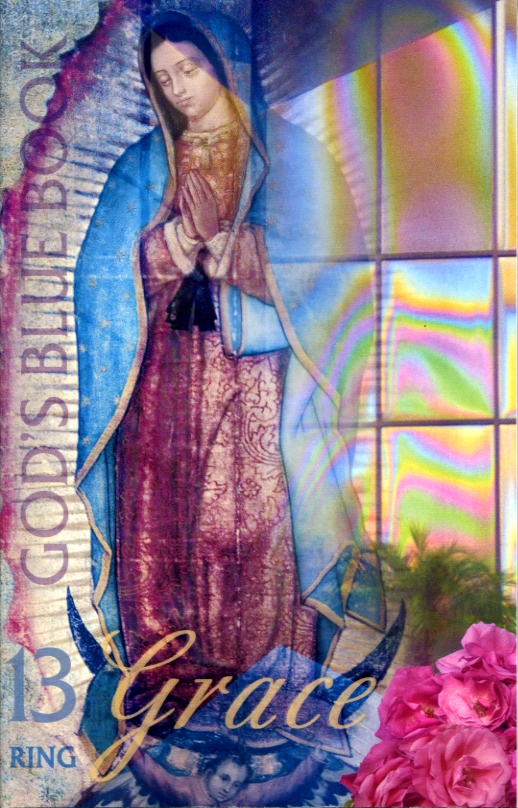
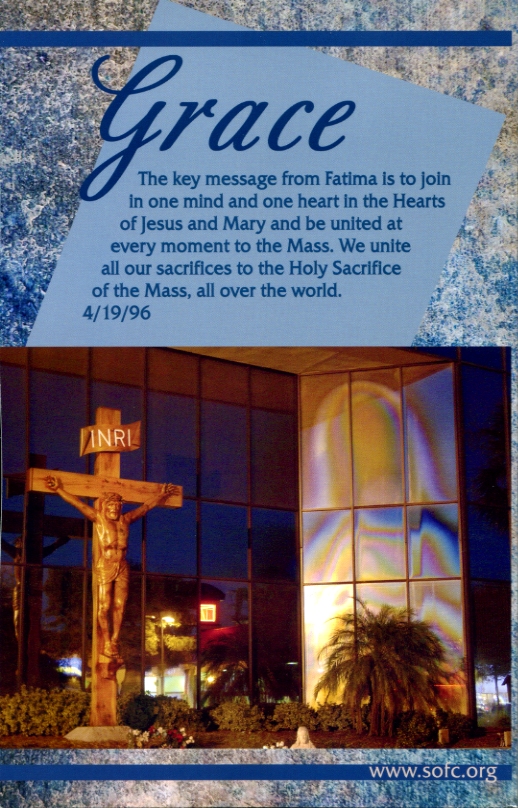
Blue Book 13 is now available
$3.00 plus postage
August 8, 2014
Anniversary of when Fr. Carter went
into the Jesuits and Rita’s BirthdayMy Dear Friends,
I give my heart to Jesus and Mary with you in love.
Here is Blue Book 13.
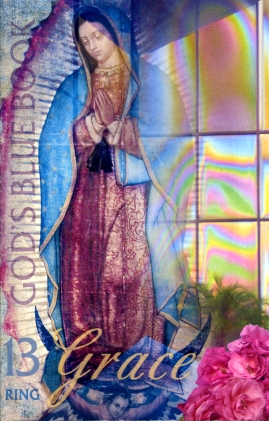
“The key message from Fatima is to join in one mind and one heart in the Hearts of Jesus and Mary and be united at every moment to the Mass. We unite all our sacrifices to the Holy Sacrifice of the Mass, all over the world.” -- April 19, 1996
Jesus told me to begin the 13ths on October 13, 1996.
This is enclosed in this book.
Then Mary appeared on the building in Clearwater December 17, 1996 -.Pope Francis’ birthday!!!Mary appeared on the building 7 1/2 years after that until her image head was destroyed.
In this book you will see why God wants us to reach the world with the consecration to the Hearts of Jesus and Mary. Devotion to the Sacred Heart and Immaculate Heart.
Mary asked for this almost 100 years ago at Fatima and said we must listen and if we don't there will be World War 2 and there was.
World War 2 affected the whole world. 66,000,000 people were killed.The message of Mary is to pray for our priests, the Church and the world.
Our priests were sent by God to help souls to get to heaven.
Priests need God's grace to do all they can for the precious souls Jesus died for.
The prayer chapters are to help bring down this tremendous grace - Jesus promised Fr. Carter.
Only God can help this troubled world.
God asked us to pray these prayers for grace.
Grace for the priests.
Grace for the Church.
Grace for the world.
(The Prayer Brochure is enclosed of the prayers Jesus gave Fr. Carter.)This is the message of Mary at Clearwater, Pray united to the Mass for grace.
Being in one mind and one heart with the Sacred Heart and Immaculate Heart will help us to have unity and love in the world as the Father intended.
Pray for grace.
Pray for the priests who bring us this grace - Our Lady of Clearwater and Our Lord said.United to the Mass in the Morning Offering and pray for grace for ourselves and, our families, and the world,
All Day.
Please Mary appeared.We are to be witnesses and spread the Good News.
We are to be children of light.Mary is full of grace.
Pray for an increase of God's grace in us and upon the world.
Grace!!
Grace!! Grace!!Grace is a sharing in God's life.
We receive a sharing in God's life in baptism!!
Grace, Grace, Grace!!!The Father, Son and Holy Spirit live in our graced baptized soul.
Grace, Grace, Grace.
We want to be filled more and more abundantly with God's grace - His life in us.Please do as Mary asked at Clearwater - Spread the Blue Books - Open anywhere.
Spread the Shepherds of Christ Prayer Chapters - Jesus gave Fr. Carter.They are so powerful.
Priests, Parishes are so powerful when you pray these prayers.
Families are united when we spread this devotion.
School children are united, parishes united, families united when they have this devotion to the Sacred Heart and have these images and pray to the Sacred Hearts.The Hearts of Jesus and Mary are the Hearts of greatest love.
Mary promised at Fatima there would be an era of peace.
We must pray for unity in Their Hearts and for the Reign of the Sacred Heart and the Triumph of the Immaculate Heart.On December 5th, 1996 Jesus appeared on the cross at the point of death His mouth moving - no words could I hear.
That night He said no one was listening.
12 days later Mary appeared in Clearwater.Please study this book.
Pray the rosaries.
Read Mary and Jesus' messages
and tell people about Clearwater.
This introductory price on this book is only $4.00, copy enclosed is our gift to you, please spread additional copies to your friends.Please tell the world Mary appeared in Clearwater for 7 and 1/2 years on the building.
She looked like Our Lady of Guadalupe!!!Mary said souls are going into hell.
When Mary appeared in Clearwater it was Pope Francis' birthday - 5 Days after the Feast of Our Lady of Guadalupe.Mary still appears to me in the building.
She appeared last night - August 5th, she appeared June 2, 2014 and the next night June 3, 2014.
Mary has appeared to me for 20 years on July 5, 2014.Please help us spread this message.
Help us spread the prayer chapters.Please visit Clearwater, I am there every month the 2nd, 3rd, 4th and 5th, praying especially for you and your family, besides the priests, the Church and the world.
Please come. Thanks
Love,
Rita
Blue Book Blow Out for Christmas
Give the gift that keeps giving this Christmas
6 different Blue Books for $30.00 including postage
|
|
|
|
|
|
|
|
|
|
|
|
|
|
|
|
|
|
Books available in limited supply for this sale.
Blue Book Blow Out for Christmas
Blue Book 1 – $6.00 each plus postage

Blue Book 2 – $5.00 each plus postage
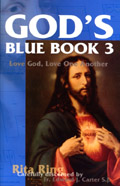
Blue Book 3 – $4.00 each plus postage



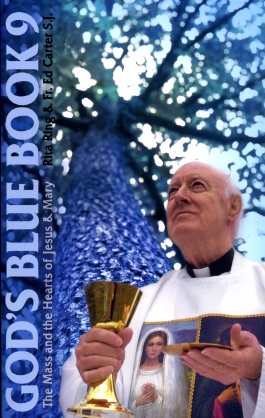
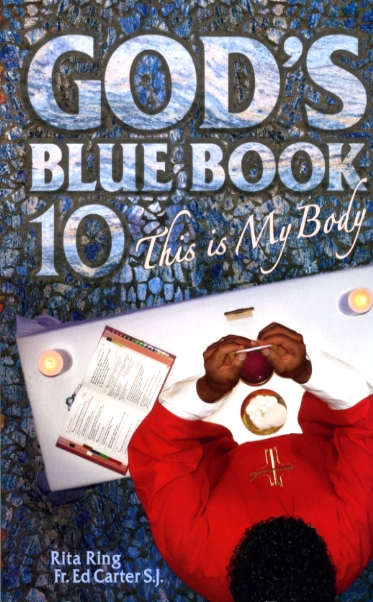

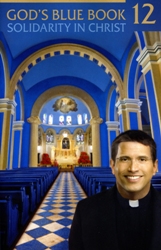

Blue Books 13, 12, 11, 10, 9, 8, 7,
6A, B, C –
$3.00 each plus postage


Blue Books 4 & 5 –$2.00 each plus postage
The more you use the Blue Books and
become one with Jesus – more
intimate with Jesus –
the more your lives are a blessing and
everything you do in life can help
to bring down great grace for the world
because of your being so
one with Jesus.
Guiding Light Homily Book Series
Fr. Joe’s Books
|
|
|
|
|
4 for $20 plus postage of $5.95
These books can be given to:
1) All Priests
2) Good for Music Ministers
3) Good for DRE's
4) Good for Deacons
5) Good for Principals of Schools
6) Good for Teachers
7) Good for Mom and Dads
This statue was handmade and
hand-painted
and has a little piece of the glass
from the image face of Mary –
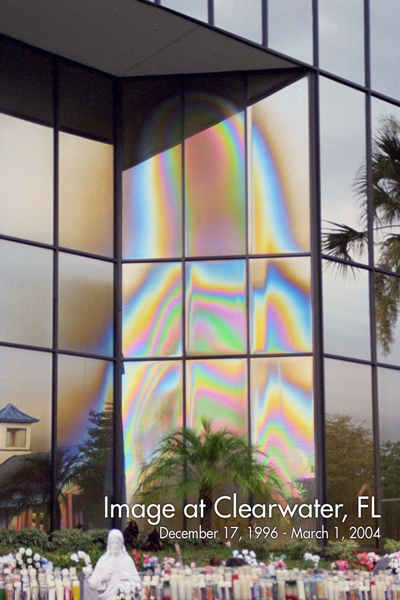
|
PV-Fatima w/glass - 27  |
PV-Fatima w/glass - 18  |
PV-Fatima w/glass - 15  |
OL-Fatima w/glass - 18 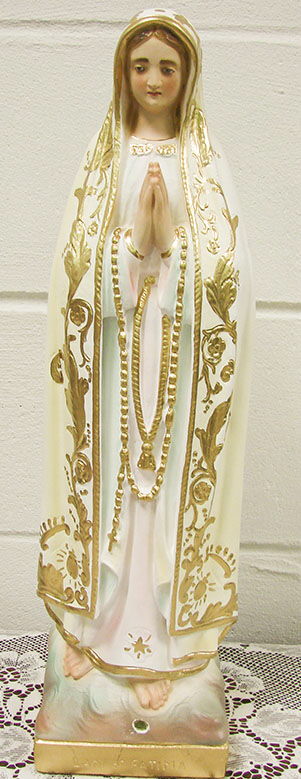 |
PV-Fatima w/glass - 12 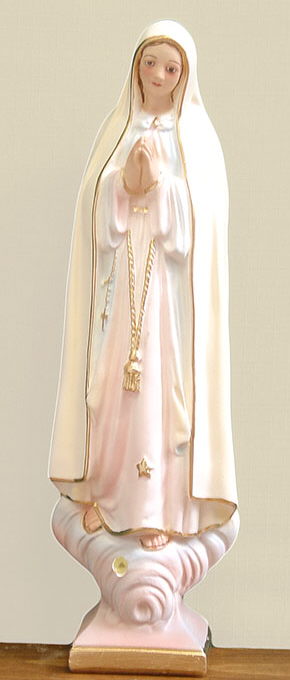 |
OL-Fatima w/glass - 11 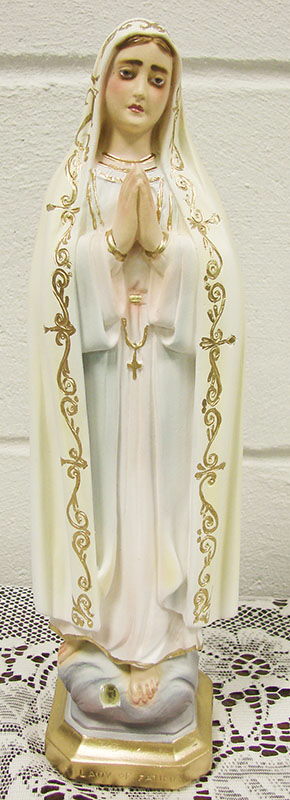 |
|
OL-Guadalupe
w/glass - 28 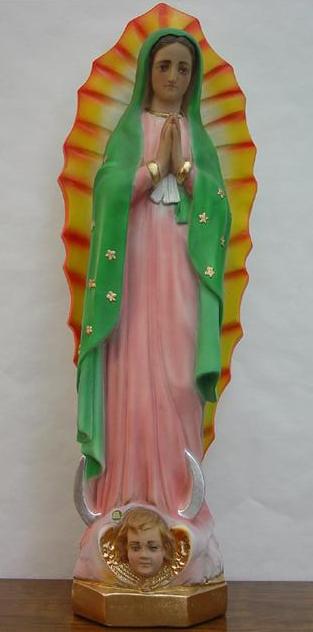 |
OL-Grace
|
OL-Mt.
Carmel w/glass - 24 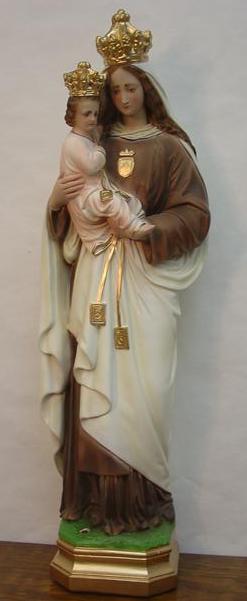 |
OL-Lourdes
|
IH-Mary
|
IH-Ivory
|
|
SH-Jesus
w/glass - 24 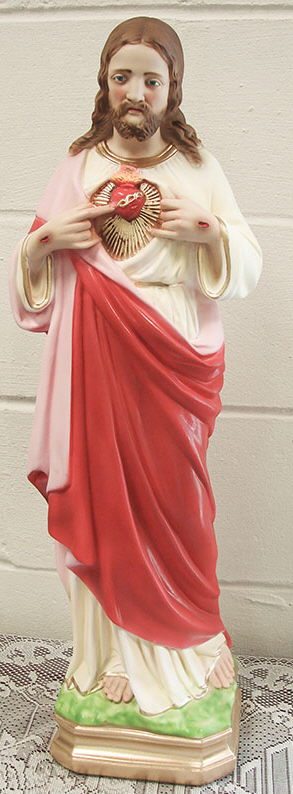 |
SH-Blessing
w/glass - 24 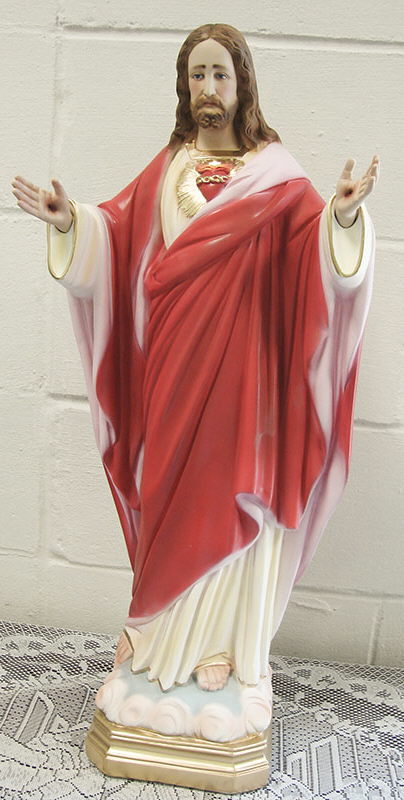 |
Sorrow
M
w/glass - 24 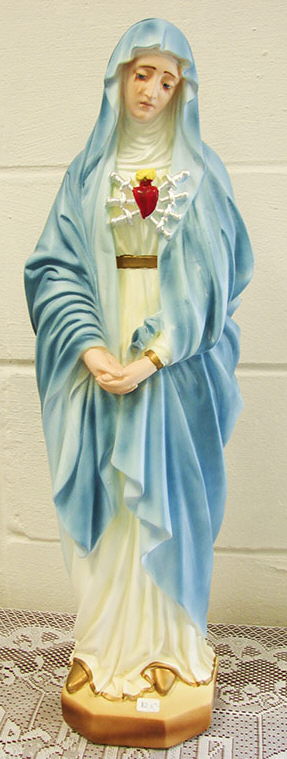 |
Inf.-Prague
w/glass - 24  |
OL-Lourdes
|
OL-Mt.
Carmel w/glass - 18 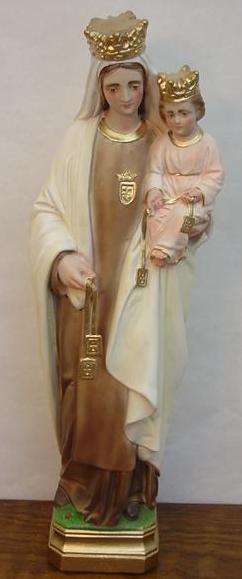 |
|
I
Heart
|
I
Heart
-
Ivory |
OL-Grace
|
SH-Jesus
w/glass - 18 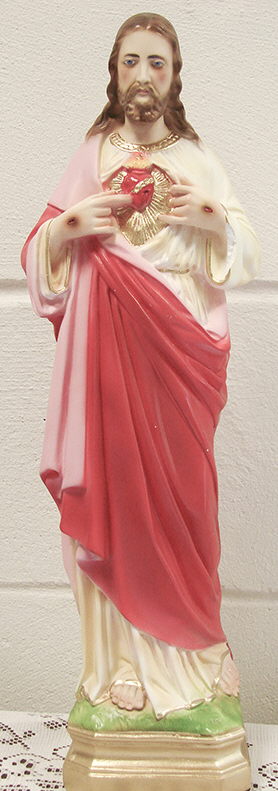 |
OL-Guadalupe
w/glass - 12 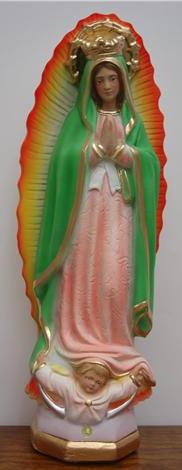 |
We
cannot
get
these
statues
any
more
–
the
men
making
them
were
from
Portugal
and
no
longer
do
so
We
will
have
a
limited
number
until
they
are
gone
–
These statues are a treasure, a work of art
At
the
end
of
this
message
are
healings
from
statues
and
the
Jesus
and
Mary
waters
–


Given March 21, 2014
R. Pray for These Things
1) Pray for the Pope & hierarchy to help us start prayer chapters.
2) Pray for Dan, Sally Jo, Richard, Carol, Margaret, Sue,
Jack, Jean, Amanda, Special intentions
3) Pray for the priests, the Church and the world!
4) Pray for the spread of prayer chapters,
also for the spread of priests doing prayer chapters.
5) Pray for the spread of Blue Books.
6) People going to Florida and China.
7) Vocations to all 7 categories.
8) Pray for spread of Consecration and Rosary.
9) Pray for pope helping us.
10) Pray for Jeff - sales & health. Pray for Nick.
11) Blue Book 14 cover; Blue Book 13 – all involved.
For our Publisher and all involved
12) All intentions on my list, Jerry's list.
13) Priests getting Fr. Joe's book.
14) Pray for Fr. Joe's new book, cover & funds for printing & postage.
15) Donors and members and their families.
16) Healing of the Family tree.
17) Dan & Melanie, Catherine & mom, Gary, Mary Jo,
Jim & statues, Fr. Ken, Monsignor, Kerry, Tom & wife.
18) All who asked us to pray for them.
19) All we promised to pray for.
20) Rita, John, Doris, Sheila, Jerry, Regina, Sanja,
Betty, Sophie, Lisa, Eileen, Fr. Mike, Louie,
2 Dons, Mary Ellen, Fr. Joe, all priests helping us,
Ed, Jimmy, Steve, a special couple, Rosie & all involved.
21) 2 babies and moms.
22) Funds and insurance.
23) Jerry's garage.
24) In thanksgiving for gifts, graces, & blessings received.
25) Spread the Blood of Jesus on all of us here.
26) Consecrate all hearts.
27) Cast the devil out of all of us here and all in Movement.
We need money for
Fr. Joe's new homily book
(we sent almost 40,000 to priests,
cardinals, bishops)
Can you please help us?
888-211-3041
The Wedding Rosary
Crystal Image Rosary
$40 plus shipping
Special First Communion Rosary with Image Center
in a gift box
white blue red
and an 8 x 10 picture of Our Lady of Clearwater
and a 4 x 6 picture of Our Lady of Clearwater$10 plus postage
Original Image Rosary
8mm glass beads
in a matching gift box$40 plus shipping
Special Sale Statues with image glass
15" Pilgrim Virgin Fatima – $85
12" Our Lady of Fatima – $75
plus shipping
while supplies lastCall Regina 1–727–776–2763
Call Rosie 888–211–3041
In Spanish with the Imprimatur
Also we are ready to print
5000 copies of the
Parents and Children's Rosary Book
in SPANISH.
Can you help with a donation?
Give the gift that counts.
Give to your priests Fr. Carter's Books plus postage.
Tell My People $5.00
Response to God's Love $8.00
Response in Christ $8.00
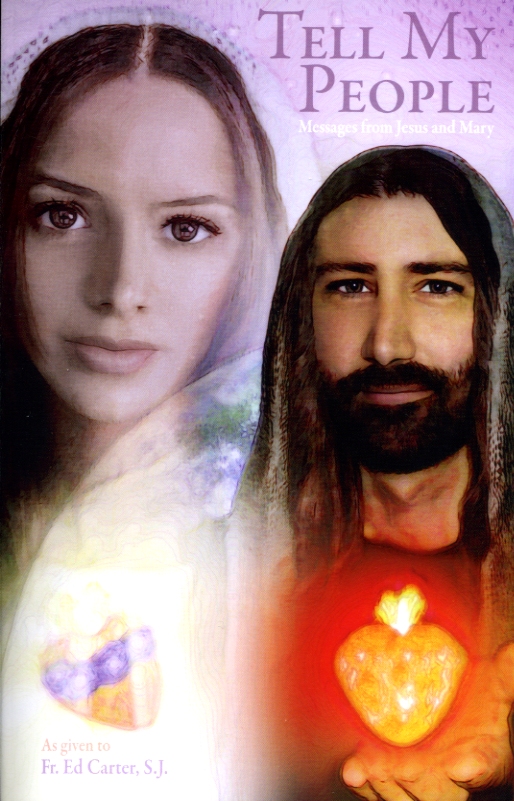
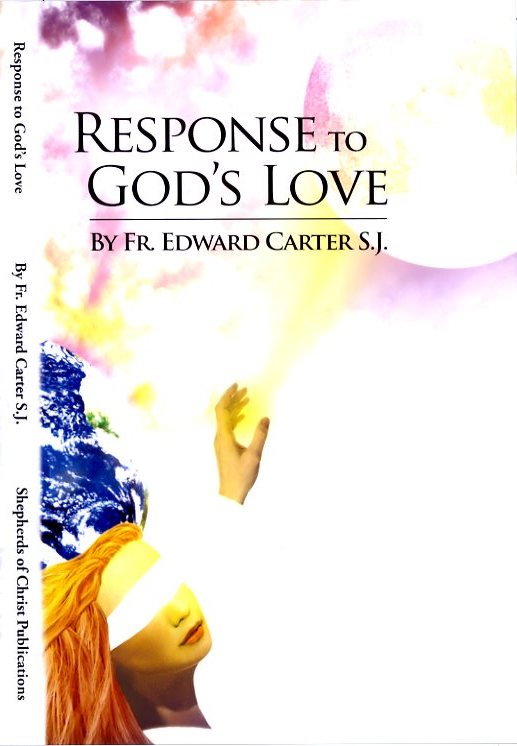
God's Blue Books 4, 5, 6A, 6B, 6C, 7, 8, 9, 10, 11, 12, 13
$4.00 each plus postage
Blue Book 4
Blue Book 5
Blue Book 6A
Blue Book 6B
Blue Book 6C
Blue Book 7
Blue Book 8
Blue Book 9
Blue Book 10
Blue Book 11

Blue Book 12 & 13
Old Mass Books with the Imprimatur
$2.00 plus postage
New Mass Book with Imprimatur
$8.00 plus postage
New Parents & Children's Book with the Imprimatur
$8.00 plus postage
Fr. Joe's Cycle A – Steadfast to the Sun – Starts in Advent
$5.00 plus postage
Give the gift that keeps on giving!
Give to your priest.
Fr. Carter's Priestly Newsletters Book II
$6.00 plus postage
Special sale statue with glass
27" Statue of Our Lady of Fatima
$175 plus postage
Get a canvas print of Mary's image
with a sliver of glass and a little
bottle of Jesus and Mary water.
The glass will be fixed behind the
back of the picture.
$200.00 plus postage
Dan called and gave the report to me, when I hung up I saw this rainbow and took a picture for him.
Shepherds of
Christ Ministries P.O. Box 627 China, Indiana 47250
Telephone: (toll free) 1-888-211-3041 or (812) 273-8405
FAX: (812) 273-3182